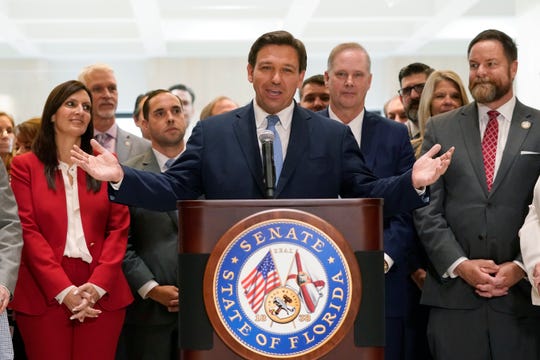Why Florida Gov. DeSantis signed voting rights restriction on Fox News
In a way, it was poetic that Republican Gov. Ron DeSantis appeared live on Fox News this week to sign a law restricting voting rights in Florida. After all, Fox & Friends, like much of its parent network, isn’t really a news outlet just as the law, despite Republicans claiming otherwise, isn’t really about stopping voter fraud. Voter fraud, like facts on Fox News, is so rare as to be basically non-existent. And most loyal consumers of Fox News and other right wing outlets will never be exposed to the truth about Republicans’ unfair, un-American crackdowns on voting rights because of the other front in the GOP’s assault — the crackdown on the right to protest.
Historically, protests are the way in which marginalized groups make their voices and perspectives heard. If you don’t have enough clout to get a hearing in the legislature, or enough power to get your story in the media, at least you can take to the streets and, hopefully, be heard.
But in an hyper-polarized political and media landscape — where whole segments of the nation are literally shut off from the perspectives let alone basic facts pertaining to the rest of the nation — protest is also the only way that dissenting perspectives even reach those audiences. That’s exactly why Republicans in Florida and other states have simultaneously restricted protest rights at the same time they’ve restricted voting rights. Indeed, just last week DeSantis signed a law limiting the right to protest in Florida. So while Republicans have introduced over 250 voting restriction bills in 43 state legislatures since the beginning of 2021, they have also introduced bills in 31 states to crackdown on and criminalize protests and protesters. The goal, very simply, is to manipulate voting to maintain their political power while also maintaining a stranglehold on public opinion by literally silencing any dissent.
Simply put, Republicans are afraid of the future. The protests for Black Lives this past summer were multiracial demonstrations, Americans of all races and walks of life coming together to demand justice and equality. They were also moving, radical acts of hope and faith — and power. To witness the protests in Minneapolis or Louisville or Atlanta was to watch America trying to become itself, trying to express pluralism and equity not as buzz words but tangible possibilities — Americans standing together, stretching the muscle of solidarity, holding up a mirror of the nation we are becoming. And the protests made change. While still nascent in an historical sense, the summer’s protests and the Black Lives Matter movement in general have already shifted the national conversation around racial justice and police accountability. Those who fear equity and inclusive democracy think the way to stop the power of the protests is to stop the protests themselves.

Surrounded by lawmakers, Florida Gov.Ron DeSantis speaks at the end of a legislative session, Friday, April 30, 2021, at the Capitol in Tallahassee, Fla. (Photo: Wilfredo Lee, AP)
Many young voters, especially young Black voters, became politicized and activated during the summer protests to bring about that pluralistic future even faster — which, in places like Georgia, directly led to a surge in Black voter registration and engagement. But at the same time polling over the summer suggested that even would-be Trump voters were favorably swayed by the protests. As is, Republicans represent a minority of voters nationwide and yet manage to maintain disproportionate power through gerrymandering and voter suppression. But that clearly isn’t stopping the future and thus their crackdowns on democracy are becoming more desperate and severe.
With apologies to poet Gil-Scott Heron, it’s clearer now than ever that our democracy will not be televised. Protests of the people, by the people, for the people, are the last way we protect and perfect our democracy for us all. It’s where we, together, take action against injustice and present a better picture of a possible future. The streets are the people’s media platform. If we can’t protest, we’ll be left at the whims of manipulative politicians and their performative media productions. Truth is already on life support. Democracy will die next.
Protesting and voting are two essential parts of the democratic formula. We can only defend our democracy — and usher in an inclusive and just future for all — when we defend the right to vote alongside the right to protest.
Judith Browne Dianis is the executive director of Advancement Project National Office.
You can read diverse opinions from our Board of Contributors and other writers on the Opinion front page, on Twitter @usatodayopinion and in our daily Opinion newsletter. To respond to a column, submit a comment to [email protected].
Source: Read Full Article

